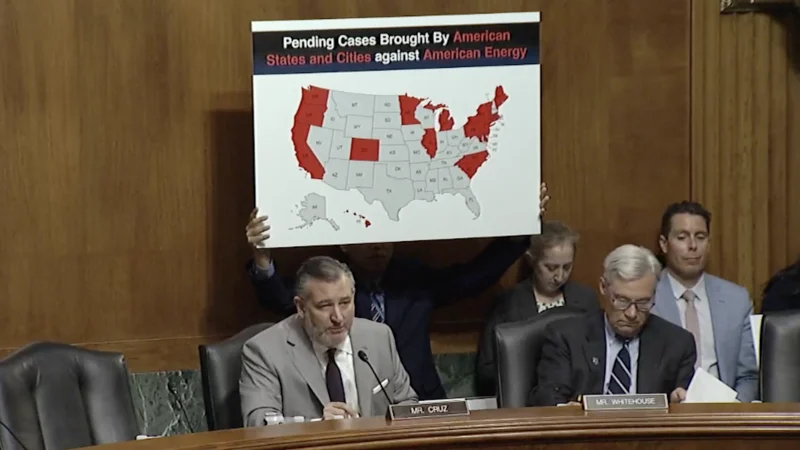China coordinates with the “radical left” and uses climate activism as a cover to undermine American energy independence, Republicans said at a U.S. Senate committeehearing Wednesday.
Chair of the Senate Judiciary subcommittee on federal courts, U.S. Sen. Ted Cruz, R-TX, said China has masqueraded behind a feigned concern for climate change to influence American education and legal and political systems through organizations like the Energy Foundation China.
The Energy Foundation China is a nonprofit organization that awards climate research grants to American universities and is also involved in climate strategy events with American lawmakers. According to its website, the foundation “operated jointly with the United States Energy Foundation as a single institution” until 2019, when the institution split into two to “increase operational effectiveness.” Some of its leadership formerly held senior positions in the Chinese government, including its CEO.
“There is a coordinated assault by the radical left, backed and paid for by the Chinese Communist Party, to seize control of our courts, to weaponize litigation against our energy producers, all in order to undermine American energy dominance,” Cruz said.
The foundation also has contributed more than $12 million to American environmental advocacy groups, according to Cruz, that lobby for and against legislation and “routinely file lawsuits trying to block pipelines, trying to ban gas-powered vehicles and trying to bankrupt oil and gas companies.”
The campaign is all meant to undermine U.S. energy independence, Cruz said.
“First, foreign money from entities tied to the Chinese Communist Party flows into the United States to bankroll climate advocacy groups who litigate against American energy. Second, activist lawyers flood our courts with lawsuits designed not to win policy debates but to bankrupt energy producers and to dismantle energy infrastructure through sheer attrition,” Cruz said.
Donors to the foundation have also given to the Environmental Law Institute, which houses the Climate Judiciary Project, a group that works to educate the judiciary on climate-related matters – the third “prong” of the “radical left’s” strategy, according to Cruz.
“Third, the judiciary itself is being quietly captured and brainwashed as left wing nonprofits host closed door trainings that indoctrinate judges to adopt the ideological goals of the climate lawfare machine,” Cruz said.
Committee Democrats called Cruz and Republicans’ perspective a conspiracy theory and suggested conservatives are using it as a smokescreen to conceal the fossil fuel industry’s guilt in using the same tactics.
“The hearing ignores that the fossil fuel industry has for decades benefited from secret funding to wage war on the American consumer by making energy more expensive and dirtier, higher utility bills, worse pollution,” said committee Ranking Member Sen. Sheldon Whitehouse, D-RI, claiming that the fossil fuel industry spends much more on lobbying than environmental groups and also contributes to election campaigns.
Cruz questioned the foundation’s activism when China is known to be the world’s leading polluter.
“If this is truly about reducing emissions, why isn’t China investing that money in reducing its own pollution? China is the number one polluter on planet Earth,” Cruz said.
The Attorney General of Kansas, Kris Kobach, also testified before the committee Wednesday, saying that climate activistists in blue states are setting policy for the entire U.S.
“There are two new types of litigation we’re seeing just in the last few years. First, we are seeing laws or regulations coming from specific states that are extraterritorial in scope. In other words, the law doesn’t just regulate the state and the residents of that state. It attempts to regulate the whole country,” Kobach said.
Kobach gave California’s clean truck mandate as an example. Though California passed the mandate as a state law, because California has so many ports and is such an essential part of shipping and commercial transportation, the regulation would apply to trucks traveling through the state for “one bit of one day,” Kobach said, that it was a “nationwide rule” that’s in effect. Other states have passed similarly broad-reaching laws, which the Chinese American Planning Council lobbied for. Kobach described the council as “CCP-backed.”
The other kinds of lawsuits are lawsuits where the plaintiffs (perhaps a particular county or city) attempt to represent “the broadly writ health and welfare of the citizens of the state,” which Kobach says “usurps” the role of the state attorneys general. There are 30 such lawsuits currently underway across the country, according to Kobach.
While Kobach was reluctant to identify clear “China connections” because his “experience is greatest in the litigation,” he said Congress could help determine how these lawsuits, some of which have been happening for close to a decade without any awarding of damages, are being funded.
“The money is coming from somewhere. The foundations are getting their money from somewhere. It’s reasonable to ask if China is part of that equation. And I think I would hope that there’d be bipartisan support for disclosing foreign funding of third party litigation,” Kobach said.
Committee Democrats didn’t delve deeply into whether claims about China’s role in America’s shift away from fossil fuels had merit but instead said the fossil fuel industry had knowingly hidden the effects of climate change to continue reaping economic gains.
The industry “actively lied and deceived people, spending millions of dollars on a deception campaign to cast doubt on science that the industry itself knew was correct,” according to David Arkush, director of the Public Citizen’s climate program.
Whitehouse said that he is sponsoring a bill that would “end dark money” in political campaigns and that Republicans have voted against it; Cruz challenged that claim and said he had sponsored a bill that would effectively eliminate super PACs and that Democrats had voted against it many times.






